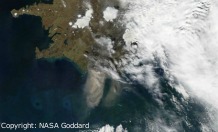
This project monitors the spread of contaminating gases and fluids in the environment, especially those which are detrimental to public health and safety.
UKIERI Bid success
Dr Prathyush P Menon has recently been awarded a thematic partnership funding from the UK-India Education and Research Initiative (UKIERI) for a new research project, which will involve collaboration with the Indian Institute of Science (IISc) at Bangalore, India.
The UK Team is led by Dr Menon, lecturer in the Centre for Systems Dynamics and Control (CSDC), College of Engineering, Mathematics and Physical Sciences (CEMPS). Working with him are Professor Peter Ashwin (CSDC) and Professor Jim Haywood (Exeter Climate Systems). The Indian team consists of Professor Debasish Ghose, from the department of aerospace engineering, IISc, Bangalore, India. They will combine their expertise in control and optimization, distributed systems, network dynamics and modelling of aerosol and pollutant dispersion.
Entitled Contamination Monitoring using Mobile Sensor Networks, the project monitors the spread of contaminating gases and fluids in the environment, especially those which are detrimental to public health and safety. The volcanic ash cloud that disrupted air traffic over the European airspace in May 2010, and the “Deepwater Horizon” Gulf of Mexico Oil Spill are both examples of contaminant spreads with far reaching consequences from the recent past. Diffusion and spread of industrial pollutants through various fluid media is an unfortunate reality in India and is a matter of great concern to government authorities, such as the Central Pollution Control Board under the Ministry of Environment and Forests.
Stationary monitoring systems can be inadequate to monitor a changing contamination region. On the other hand, there is great potential for multiple autonomous moving agents/sensors to efficiently monitor contamination; and the challenge lies in realizing this potential. This project will investigate novel algorithms and methods for monitoring and tracking dynamic contaminant boundaries using mobile sensor networks.
UKIERI was started in 2006, and aims to enhance educational links between India and the UK. In the field of higher education, the programme is working to build research links between centres of excellence in the two countries, increasing collaboration and engagement. This research project is one of three recent successful UKIERI bids at Exeter.
Exeter has established representation in India, and has been building up several strong research links with top Indian universities over the last few years. Annual exchange visits are planned as part of the project, with Exeter and the IISc looking to host two research students each for a period of two months.
Menon says "The project deals with issues that are topical and of crucial importance to both countries. We expect that these results will be of great interest to pollution control and environmental agencies, as well as those that monitor the effect of contaminant on ecological resources such as DEFRA, The UK Met Office, Health and Safety Commission (HSC) UK and Central Pollution Control Board under the Ministry of Environment and Forests, Government of India".
Date: 11 January 2012
